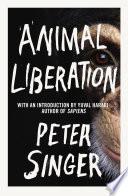Works
Famous Peter Singer Quotes
Source: Practical Ethics
“The principles of ethics come from our own nature as social, reasoning beings.”
Source: The Expanding Circle: Ethics, Evolution, and Moral Progress (1981), Chapter 6, A New Understanding Of Ethics, p. 149
Peter Singer Quotes about animals
“Human beings are social animals. We were social before we were human.”
Source: The Expanding Circle: Ethics, Evolution, and Moral Progress (1981), Chapter 1, The Origins Of Altruism, p. 3
“Animal Liberation is Human Liberation too.”
Preface
Animal Liberation: A New Ethics for our Treatment of Animals (1975)
Source: Animal Liberation: A New Ethics for our Treatment of Animals (1975), Ch. 4: Becoming a Vegetarian
Source: Animal Liberation: A New Ethics for our Treatment of Animals (1975), Ch. 6: Speciesism Today
Source: Animal Liberation: A New Ethics for our Treatment of Animals (1975), Ch. 6: Speciesism Today
Source: Animal Liberation: A New Ethics for our Treatment of Animals (1975), Ch. 1: All Animals Are Equal
Peter Singer: Trending quotes
'Last Generation': A Response http://opinionator.blogs.nytimes.com/2010/06/16/last-generation-a-response/, New York Times, June 16, 2010.
“I am a utilitarian. I am also a vegetarian. I am a vegetarian because I am a utilitarian.”
Utilitarianism and Vegetarianism, Philosophy & Public Affairs, 9(4): 325 (1980).
Peter Singer Quotes
Source: The Life You Can Save: Acting Now to End World Poverty
“We are, quite literally, gambling with the future of our planet- for the sake of hamburgers”
Source: Animal Liberation
Source: Writings on an Ethical Life
Peter Singer - The Genius of Darwin: The Uncut Interviews - Richard Dawkins https://www.youtube.com/watch?v=GYYNY2oKVWU, 2009.
Source: Practical Ethics
Context: Speciesism is an attitude of prejudice towards beings because they're not members of our species, so just as racism means that you're prejudiced against beings who are not members of your race and sexism means you're prejudiced against people of the other sex. So we humans tend to be speciesist in we think that any being that is a member of the species homo sapien just automatically has a higher moral status and is more important than any being that is a member of any other species, irrespective of the actual characteristics of those beings.
Source: Animal Liberation
Source: The Life You Can Save: Acting Now to End World Poverty
Source: The Expanding Circle: Ethics, Evolution, and Moral Progress (1981), Chapter 4, Reason, p. 120
Source: Animal Liberation: A New Ethics for our Treatment of Animals (1975), Ch. 4: Becoming a Vegetarian
an act which it would be good to do, but not wrong not to do. On the contrary, we ought to give the money away, and it is wrong not to do so.
Famine, Affluence, and Morality http://www.utilitarian.net/singer/by/1972----.htm, 1972.
Interview with the Jewish Chronicle https://www.thejc.com/lifestyle/interviews/peter-singer-is-he-really-the-most-dangerous-man-in-the-world-1.34980, Dan Goldberg, 16 August, 2012.
Source: The Expanding Circle: Ethics, Evolution, and Moral Progress (1981), Chapter 3, From Evolution To Ethics?, p. 61
“We are responsible not only for what we do but also for what we could have prevented.”
Introduction (p. xv)
Writings on an Ethical Life (2000)
Source: The Expanding Circle: Ethics, Evolution, and Moral Progress (1981), Chapter 5, Reason And Genes, p. 145
Source: Animal Liberation: A New Ethics for our Treatment of Animals (1975), Ch. 1: All Animals Are Equal
Source: The Expanding Circle: Ethics, Evolution, and Moral Progress (1981), Chapter 6, A New Understanding Of Ethics, p. 172
Source: The Expanding Circle: Ethics, Evolution, and Moral Progress (1981), Chapter 4, Reason, p. 119
Source: The Expanding Circle: Ethics, Evolution, and Moral Progress (1981), Chapter 2, The Biological Basis Of Ethics, p. 27
Preface To The 2011 edition, p. xi
The Expanding Circle: Ethics, Evolution, and Moral Progress (1981)
Source: Practical Ethics, 3rd Edition (2011), Ch. 3: Equality for Animals? (p. 49)
Source: The Expanding Circle: Ethics, Evolution, and Moral Progress (1981), Chapter 4, Reason, p. 88
Source: The Expanding Circle: Ethics, Evolution, and Moral Progress (1981), Chapter 6, A New Understanding Of Ethics, p. 167
Source: The Expanding Circle: Ethics, Evolution, and Moral Progress (1981), Chapter 6, A New Understanding Of Ethics, p. 157
Source: The Expanding Circle: Ethics, Evolution, and Moral Progress (1981), Chapter 1, The Origins Of Altruism, p. 5
Source: The Expanding Circle: Ethics, Evolution, and Moral Progress (1981), Chapter 4, Reason, p. 88
Source: Animal Liberation: A New Ethics for our Treatment of Animals (1975), Ch. 4: Becoming a Vegetarian
“Everyday we act in ways that reflect our ethical judgements.”
Source: The Expanding Circle: Ethics, Evolution, and Moral Progress (1981), Chapter 3, From Evolution To Ethics?, p. 69
p. 238 http://books.google.com/books?id=BoDMBgAAQBAJ&pg=PT238
Writings on an Ethical Life (2000)
Afterword To The 2011 Edition, p. 187
The Expanding Circle: Ethics, Evolution, and Moral Progress (1981)
Source: Animal Liberation: A New Ethics for our Treatment of Animals (1975), Ch. 4: Becoming a Vegetarian
Quoted by Michael Specter on the impact of the book Animal Liberation, " The Dangerous Philosopher http://www.michaelspecter.com/1999/09/the-dangerous-philosopher/", The New Yorker, 6 September 1999.
Preface, p. xv
The Expanding Circle: Ethics, Evolution, and Moral Progress (1981)
... The perspective on ourselves that we get when we take the point of view of the universe also yields as much objectivity as we need if we are to find a cause that is worthwhile in a way that is independent of our own desires. The most obvious such cause is the reduction of pain and suffering, wherever it is to be found.
p. 238 http://books.google.com/books?id=BoDMBgAAQBAJ&pg=PT238
Writings on an Ethical Life (2000)
Source: The Most Good You Can Do: How Effective Altruism Is Changing Ideas About Living Ethically (2015), Chapter 15: Preventing Human Extinction (p. 177)
Source: The Most Good You Can Do: How Effective Altruism Is Changing Ideas About Living Ethically (2015), Chapter 9: Altruism and Happiness (p. 103)
Preface (p. vii)
The Most Good You Can Do: How Effective Altruism Is Changing Ideas About Living Ethically (2015)
Source: The Point of View of the Universe: Sidgwick and Contemporary Ethics (2017), p. 343


